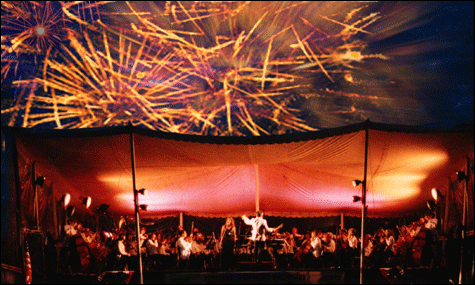
|
It so happens that Robert Browne Hall (1858-1907), a Maine composer, conductor and cornetist, had associations with numerous Maine bands — the Richmond Cornet Band, Bangor Band, Waterville Military Band (later known as R.B. Hall’s Military Band), Chandler’s Band, Cherryfield Band, Olympia Band, Colby College Band, and Portland Cadet Band. A “well-known” soloist listed in The Cornet Compendium, Hall was known to have an “incredible” playing range.
Almost forgotten, Hall was revived for commemoration by lifelong enthusiast Thomas C. Bardwell Sr. (1917-1999), who was noted in a 1999 memorial by Wendy Frost, clarinetist of the R.B. Hall Band, as “tireless in his efforts to get recognition for R.B. Hall.” In 1981, Governor Joseph Brennan signed into law the R.B. Hall Day holiday, inviting “ceremony and activity” to commemorate a man “whose creative talent and native ability marked him as one of Maine’s outstanding citizens.” Bardwell called Hall “one who gave so much, so fine, and received so little...even in death.”
The redress: an annual daylong concert band music gala that is free to the public. Saturday, June 30 at the Fairfield Memorial Park in Fairfield, from 8 am to 6 pm, is R.B. Hall Day, with the best of Maine’s community concert bands — the R.B. Hall Memorial Band, Hallowell Community Band, Boothbay Alumni Community Band, Bangor Band, Brewer Hometown Band, Lincolnville Band, Community Concert Band, Maine Community Band (a/k/a the Massed Band), Westbrook City Band, Bath Municipal Band, Penobscot Wind Ensemble, Old Crow, Alumni Band, Sebasticook Valley Community Band, Casco Bay Concert Band, and Italian Heritage Band.
Popular in the United Kingdom, Hall is often mistaken as English, but he’s truly ours. The Heritage Encyclopedia of Band Music: Composers and Their Music notes that his marches earned him the nickname “New England King of Marches.” Born in Bowdoinham, Hall took cornet lessons from Melville H. Andrews, and titled his first march “M.H.A.” At 19, he conducted the Richmond Cornet Band, writing three marches for them — “RCB1,” “RCB2,” and “RCB3.”
In 1882, Hall rebuilt the Bangor Band, an achievement honored in 1884 with the city of Bangor awarding him a gold Boston Three Star Ne Plus Ultra cornet; he responded by composing “Greetings to Bangor.” Other compositions include local dedications — like “Richmond Bee” and “The Sentinel” for local newspapers, and “Independentia” for the Independent Order of Oddfellows. A contemporary of Hall, John Philip Sousa conducted a Hall march at the Paris Exposition in 1900.
Hall suffered a stroke in 1902 and never recovered, dying years later in poverty. Augusta, Waterville, and Portland bands played for his funeral procession. Much of what we know of Hall is owed to Bardwell, who contributed more than 2000 live recordings of Hall marches and numerous interviews with Hall’s associates to the Fogler Library Special Collections at the University of Maine.
This year’s R.B. Hall Day is dedicated to Edgar R. Palmer (1922-2006), a Maine trumpet and mellophone player who had played with the Waterville High School Band, Old Bourque-Lavigan Post 5 Band, R.B. Hall Memorial Band, Portland Commandery Band, Hallowell Band, and Boothbay Harbor Band.